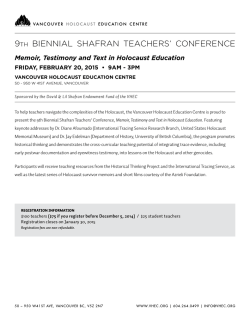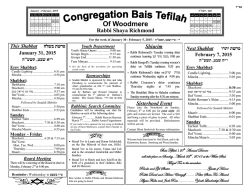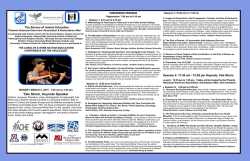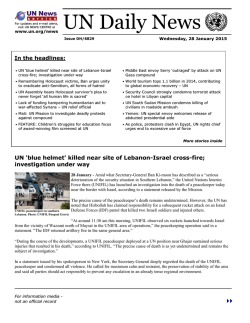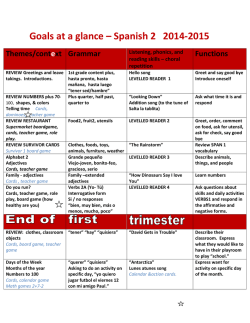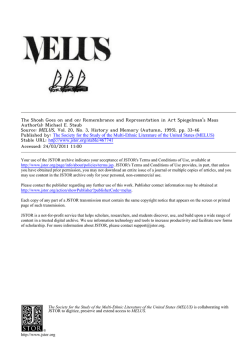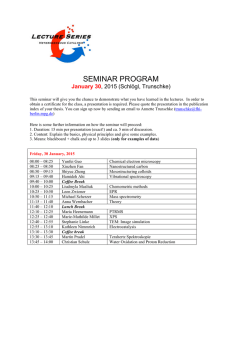
Fall 2014
Dr. Jennifer Hansen-Glucklich Dept. of Modern Foreign Languages Combs Hall 231 Tel: 202.262.1781 Email: [email protected] Freshman Seminar Representing the Holocaust in German and American Culture Syllabus Fall 2014 I. General Information: Textbooks: Canvas: Jan T. Gross. Neighbors: The Destruction of the Jewish Community in Jedwabne, Poland Art Spiegelman, Maus: A Survivor's Tale, vols. I & II Bernhard Schlink, The Reader Wolfgang Borchert, The Man Outside Robert S. Wistrich, Hitler and the Holocaust Course Reader This course uses Canvas as supporting tool. You will find on the web site the weekly lesson plans, most of the handouts, the syllabus, links to useful web pages for the course, and if appropriate the key to assignments, quizzes, and tests. Changes in the course schedule will be announced on Blackboard, so check the site regularly. II. Course Description: The Holocaust is one of the most significant events of the 20th century. That people during a period of incredible intellectual and scientific advance persist in such barbarous behavior seems such a contradiction and therefore must prompt serious inquiry about the nature of modern life, the impact of technology, the persistence of religious and ethnic hatred and the role of the state in perpetuating hatred and violence. We have an obligation to make the past useable, to interpret it in creative ways, to employ history to interrogate the present, to insure that lessons are learned and that we not be rendered immobile or apathetic by the immensity of this past evil. Critics take different positions when it comes to the question of how one “ought” to represent the Holocaust. Some see Steven Spielberg’s “Schindler’s List” as kitsch, others as monument to humanity. Are the 2.711 monumental concrete steles of the recently opened Holocaust Memorial in Berlin an appropriate way to remember the victims? In order to make sense of the rise of Nazism and its consequences, in order to acknowledge and pay tribute to the millions dead, what tools can we and should we use? How do we compare the relative claims and ambitions of “objective” historical analysis, personal testimony, literary and dramatic fiction, architectural monument, or popular film? This seminar will investigate the particular strengths and limits of a wide range of texts and images, facts and fictions that each in its own way claims to represent some “truth” of the Holocaust. We will also discuss the social and political context of these representations and consider the meaning of the Holocaust in contemporary German and American culture. . III. Course Requirements and Criteria for Grading: 1. Regular attendance, preparation and active participation 2. Two short papers 3. Presentations 4. Final Paper 30% 30% 20% 20% IV. Student Learning Outcomes: Utilize a variety of research techniques to retrieve information efficiently, evaluate retrieved information, and synthesize information effectively to support their messages or arguments Improve development and organization of written arguments Demonstrate the ability to edit and revise in the writing process Apply the basic theories and principles of oral communication Communicate effectively in a variety of settings, including public speaking and group discussion 1. Attendance and Class participation This class is a seminar, which means that class time will be given to discussion and that we will proceed more-or-less informally. My role is to direct and facilitate discussion--not to lecture--and your role is to discuss, to share ideas and to test intellectual boundaries. Our joint purpose is to learn together. As you will note below, a significant percentage of your final grade will be based on class participation. Your success in this course depends on completing the readings, coming to class prepared, and actually participating in our discussion. My policy is to allow three absences per semester without further penalty. Absences beyond that will result in a 1% reduction each of your final grade. You are encouraged to inform me of your absence in advance, whenever possible. This greatly helps with conveying assignments and lesson planning. Telling me about an absence helps you stay on track, or - at least - get back on it. However, telling does not mean the absence does not count. Please note that coming to class in itself is not considered evidence of good "class participation", rather it is a prerequisite. 2. Two short papers You will write two short papers (3-4 pages): one based on our reading and class discussions and the second one based on a film we will watch in weeks 10 and 11. (films probably will include “Schindler’s List”, the TV mini-series “Holocaust”, “Jacob the Liar”, “Sophie Scholl”, “Rosenstraße” and others) 3. Presentations At the beginning of the semester, you will sign up for a number of topics based on the readings, and you will give an initial introduction of approximately 10 minutes length. At the end of your introduction, you will pose a number of questions for class discussion. During week 14 and 15, you will present the findings of your research for the final paper to your peers in class. 4. Final Paper Your final paper (8-10 pages long) will demand that you examine a specific question about the Holocaust and that you utilize primary research. You might, for instance, investigate the controversy regarding Pope Pius XII and the Holocaust. Or one might examine the issues involved in the restitution of stolen art work to Jewish victims and their families. More detailed information will be provided later. 5. Issues of academic honesty At the beginning of the semester, I will discuss with you standards of ethical behavior in academia including those that pertain to the use of technological resources. These explanations will include the appropriate use of on-line materials in your own work. All work in this course is subject to the Honor Code. All written assignments and tests must be pledged. Grading Scale: A 100-94% A- 93-90% B+ 89-87% C+ 79-77% B 86-83% C 76-73% B- 82-80% C- 72-70% For purpose of midterm grade, D or lower equals U D+ 69-67% D 66-63% D- 62-60% F 59-0% 6. Disability Statement The Office of Disability Services has been designated by the University as the primary office to guide, counsel, and assist students with disabilities. If you receive services through that office and require accommodations for this class, please make an appointment with me as soon as possible to discuss your approved accommodation needs. Bring your accommodation letter with you to the appointment. I will hold any information you share with me in the strictest confidence unless you give me permission to do otherwise. If you need accommodations, (note taking assistance, extended time for tests, etc.), I would be happy to refer you to the Office of Disability Services. They will require appropriate documentation of a disability. Their phone number is 540-654-1266. III. SCHEDULE – Freshman Seminar (2014) WEEK 1 WEEK 4 WEEK 7 WEEK 10 WEEK 13 Introduction The Holocasut II I Read: Wistrich, 185-240 Wolfgang Borchert, The Man Outside I “Holocaust” Answer Questions from Course Reader Memorial Days and Rites Holocaust and other Genocides Read Course Reader 1-16 Jan Gross, Neighbors Read: 3-89 Wolfgang Borchert, The Man Outside II “Rosenstraße” Presentation of Final Papers WEEK 2 WEEK 5 WEEK 8 WEEK 11 WEEK 14 Preparing the Ground Read: Wistrich xi-58 Jan Gross, Neighbors Read: 90-173 Bernhard Schlink, “The Reader” I Memorial Culture – Architecture I Read: Course Reader pp. 17-48 Presentation of Final Papers The Holocaust I Read: Wistrich, 59-86 Art Spiegelmann, Maus I Bernhard Schlink, “The Reader” II Memorial Culture – Architecture I Read: Course Reader pp. 49-73 Presentation of Final Papers WEEK 3 WEEK 6 WEEK 9 WEEK 12 The Holocaust II Read: Wistrich, 87-147 Art Spiegelmann, Maus II “Schindler’s List” Answer Questions from Course Reader Memorial Culture – Art Read: Course Reader pp. 49-73 The Holocasut II Read: Wistrich, 149-83 Paul Celan, Death Fugue “Jacob the Liar” Answer Questions from Course Reader Trip to the United State Holocaust Memorial Museum
© Copyright 2026
